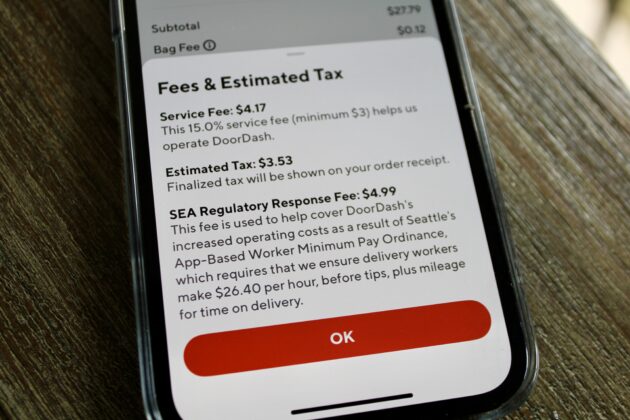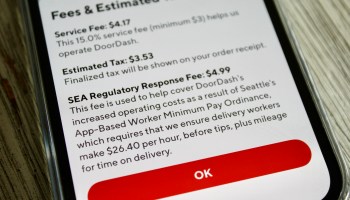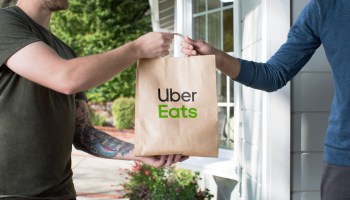
DoorDash for the first time has publicly promised to axe a $4.99 fee on consumer orders if the city passes a revised minimum wage law for delivery drivers.
The company implemented the “regulatory response fee” for consumers in January after the city’s existing minimum wage law went into effect, saying it helped “cover the cost of these new regulations.”
With the new fee in place, demand fell for DoorDash and Uber Eats, which also added its own $5 charge to each order. The companies also adjusted tip mechanisms.
Some drivers and restaurant owners then complained about the lack of orders on the platforms.
After heavy lobbying from DoorDash and Uber, Seattle City Council President Sara Nelson proposed a new set of regulations in April that would lower the minimum wage standard for drivers from $26.40 per hour to $19.97.
The council was set to vote on the legislation, CB 120775, last week but abruptly postponed the vote to consider amendments.
DoorDash said in a blog post Wednesday that it “stands ready to remove the current Regulatory Response Fee in Seattle once the reform bill is enacted and operational costs reduced.”
“To be clear, DoorDash is fully supportive of the compromise bill that would guarantee Dasher earnings of at least Seattle’s minimum wage of $19.97 per active hour, and will remove our $4.99 Regulatory Response Fee if this compromise is enacted,” Anna Powell, DoorDash government relations head for the Northwest, said in a statement. “Despite making this clear to city officials, we have been met with inaction and delays.”
A complaint filed to the Federal Trade Commission last month by a Seattle resident alleges that the fees are deceptive and misleading. It also claims that the fee “bears no reasonable or logical relationship to the companies’ costs.”
The FTC declined to comment on the complaint.
DoorDash and Uber Eats are the top two food delivery companies in the U.S. CEOs from both companies have discussed Seattle’s minimum wage debate on recent earnings calls.
“These regulations clearly are having the opposite impact of what they intend to do,” DoorDash CEO Tony Xu said earlier this month.
The response from drivers who spoke at council meetings over the past several months is mixed. Some want the city to keep the existing pay standard because they are now making enough money to cover their rent. But several others are making substantially less income because of reduced demand.
Restaurants owners also offer conflicting opinions — some support the current law, while others say the lack of demand is hurting their business.
The new ordinance would bring the minimum pay rate for delivery drivers from $26.40 to $19.97, in line with Seattle’s citywide minimum wage for employed workers.
Some argue that overall pay for drivers should account for expenses such as payroll taxes that drivers pay for on their own as independent contractors.
Seattle and New York City, which also recently implemented a minimum wage for delivery drivers, have become testing grounds for the impact of labor standards in a growing food delivery market facilitated by tech companies that tout the flexibility and independence offered by their platforms, but have come under scrutiny for their impact on workers and restaurants.
Seattle’s minimum wage legislation was passed in 2022. It’s part of several unique “PayUp” laws approved recently in Seattle. Other “PayUp” policies include an ordinance related to the worker deactivation process and a 10-cent per-order fee approved in November that will help fund the implementation and enforcement of the “PayUp” laws. Seattle also passed a sick leave law for delivery workers last year.





